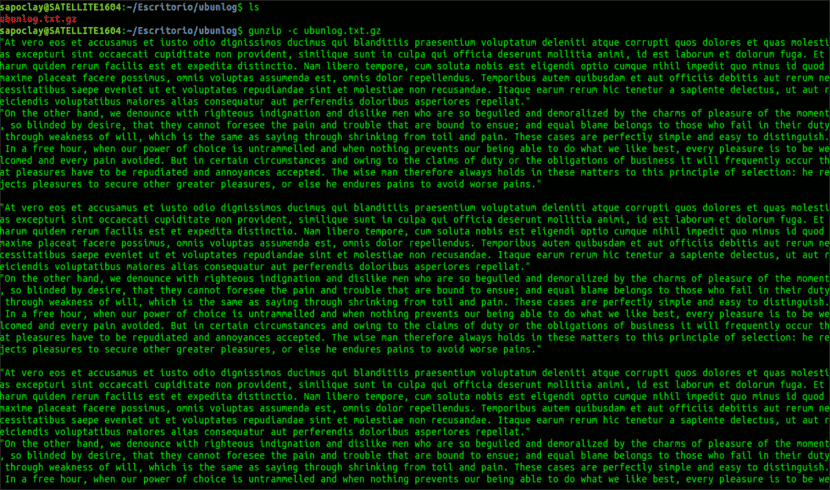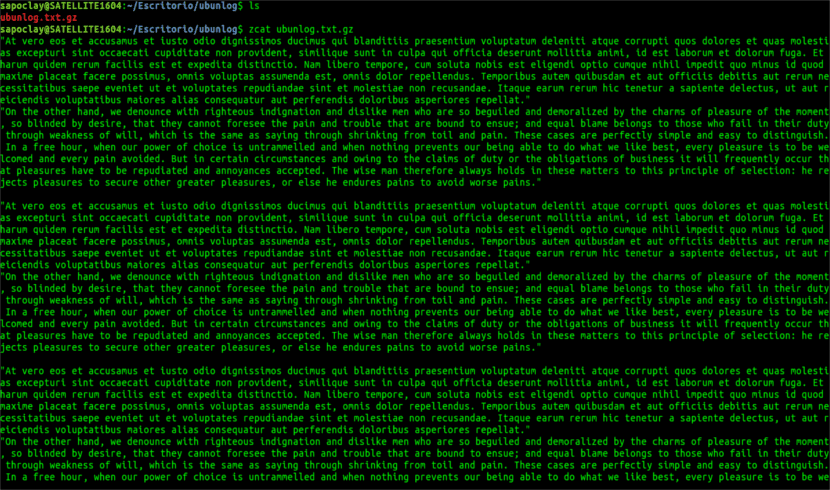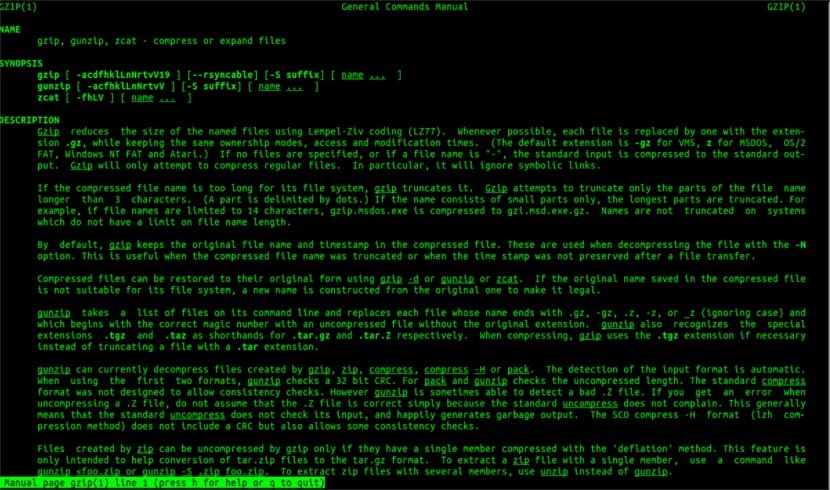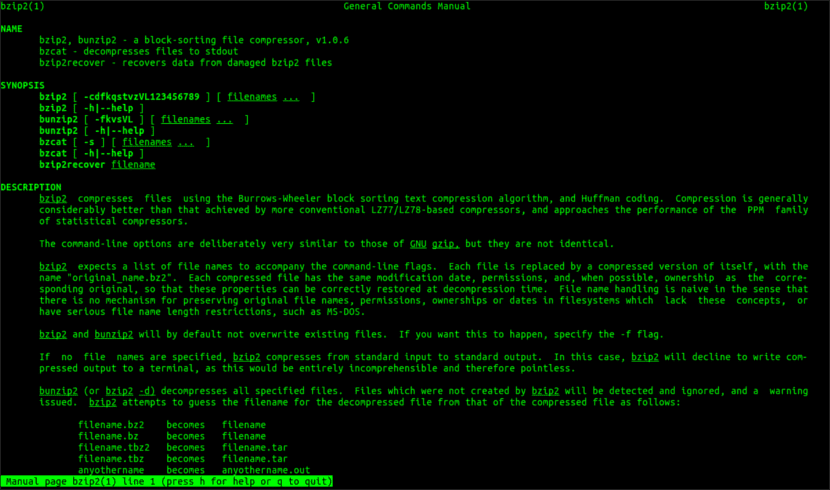What Two Commands Below Can Be Used to View the Contents of a Bzip2-compressed File Page by Page?ã¢â‚¬â€¹

In the adjacent article we will take a wait at how zip and unzip files using gzip and bzip2. Compression is very useful when backing up important files or sending large files over the Internet. Today there are many programs to compress and decompress files in GNU / Linux.
A colleague already told the states most some of these programs like rare y zip in this blog. In this tutorial, we are going to accept a look at two of them only, such as gzip and bzip2. Every bit I said, allow's see how to apply them to compress and decompress files with some examples in Ubuntu.
Table of Contents
- 1 Compress and decompress files using gzip and bzip2
- 1.1 The gzip program
- 1.1.1 Shrink files
- 1.i.2 Shrink and decompress keeping the original file
- 1.1.three Unzip files
- 1.1.4 View the contents of compressed files without decompressing them
- 1.1.5 Compress the file with gzip specifying the compression level
- 1.1.6 Concatenate multiple compressed files
- ane.2 The bzip2 programme
- 1.2.1 Shrink files
- 1.2.2 Compress the files without deleting the original file
- 1.two.3 Unzip files
- 1.2.iv View the contents of compressed files without decompressing them
- 1.1 The gzip program
Compress and decompress files using gzip and bzip2
The gzip program
Gzip is a utility to compress and decompress files using the Lempel-Ziv (LZ77) encoding algorithm.
-
Compress files
To compress a file called ubunlog.txt, replacing it with a compressed version, nosotros volition execute in the terminal (Ctrl + Alt + T):

gzip ubunlog.txt
Gzip will replace the original file called ubunlog.txt for a compressed version called ubunlog.txt.gz.
The gzip control can also be used in other ways. A good example is that we can create a compressed version of the output of a specific command. Look at the following command.

ls -l ../../Descargas / | gzip > ubunlog.txt.gz
The above command creates a compressed version of the list of files in the Downloads folder.
-
Compress and decompress keeping the original file
By default, the gzip plan will compress the given file, replacing it with a compressed version. However, we tin can keep the original file and write the outcome to standard output. For case, the following command compresses ubunlog.txt and writes the event to output.txt.gz.

gzip -c ubunlog.txt > salida.txt.gz
In the aforementioned mode, we tin can unzip a compressed file specifying the name of the output file:

gzip -c -d salida.txt.gz > ubunlog1.txt
The in a higher place command unzips the output.txt.gz file and writes the output to the ubunlog1.txt file. In the ii previous cases, the original file volition not be deleted.
-
Unzip files
To unzip the file ubunlog.txt.gz, replacing it with the original uncompressed version, we volition utilize the following control in the terminal (Ctrl + Alt + T):

gzip -d ubunlog.txt.gz
We tin also apply gunzip to unzip the files.

gunzip ubunlog.txt.gz
-
View the contents of compressed files without decompressing them
To view the contents of the compressed file without decompressing it using gzip, nosotros will use the -c option equally information technology's shown in the following:

gunzip -c ubunlog1.txt.gz
Nosotros can also use the zcat utility for the same purpose, similar below:

zcat ubunlog.txt.gz
We will be able pipe the output using the "less" command to view the output page by folio as shown beneath:
gunzip -c ubunlog.txt.gz | less
The less command tin can also be used with zcat:
zcat ubunlog.txt.gz | less
Nosotros will also take the option to use the zless program. This performs the same function as the previous pipes:
zless ubunlog.txt.gz
We tin leave paging by pressing the q key.
-
Compress the file with gzip specifying the compression level
Another advantage to keep in mind of gzip is that supports compression level. Supports 3 levels of compression equally below.
1 - Faster (peor)
ix - Slower (BEST)
vi - Default level
To compress the file called ubunlog.txt, replacing it with a compressed version with the best compression level, we will employ:
gzip -ix ubunlog.txt
-
Concatenate multiple compressed files
Another possibility that gzip offers us is that of concatenate multiple compressed files into one. We tin do this in the following way:
gzip -c ubunlog1.txt > salida.txt.gz gzip -c ubunlog2.txt >> salida.txt.gz
The higher up two commands will compress ubunlog1.txt and ubunlog2.txt and save them to a single file called output.txt.gz.
We can view the contents of the files (ubunlog1 .txt and ubunlog1.txt) without extracting them using any of the post-obit commands:
gunzip -c salida.txt.gz gunzip -c salida.txt zcat salida.txt.gz zcat salida.txt
For more details about gzip, encounter the man pages:

man gzip
The bzip2 program
El bzip2 it is very similar to the gzip program. The primary deviation is that it uses a different compression algorithm called Burrows-Wheeler block nomenclature text compression algorithm and Huffman encoding. Files compressed with bzip2 will end with the extension .bz2.
Like I said, using bzip2 is pretty much the same every bit gzip. We will simply have to replace gzip in the to a higher place examples with bzip2, gunzip with bunzip2, zcat with bzcat and so on.
-
Shrink files
To shrink a file using bzip2, replacing information technology with a compressed version, nosotros will execute:

bzip2 ubunlog.txt
-
Shrink the files without deleting the original file
If we don't want to supplant the original file, we will use the -c selection and we will write the result to a new file.

bzip2 -c ubunlog.txt > salida.txt.bz2
-
Unzip files
For, unzip a file compressed nosotros will use one of the post-obit two possibilities:
bzip2 -d ubunlog.txt.bz2 bunzip2 ubunlog.txt.bz2
-
View the contents of compressed files without decompressing them
To encounter the content of a compressed file without decompressing it, we will only take to use any of the options:
bunzip2 -c ubunlog.txt.bz2 bzcat ubunlog.txt.bz2
For more details, we can consult the human being pages:

homo bzip2
The content of the article adheres to our principles of editorial ideals. To report an error click here!.
Source: https://ubunlog.com/en/comprimir-descomprimir-gzip-bzip2/
0 Response to "What Two Commands Below Can Be Used to View the Contents of a Bzip2-compressed File Page by Page?ã¢â‚¬â€¹"
Post a Comment